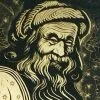Behind the veil the Gods their Secrets keep,
And past that curtain none may hope to peep;
One plot of earth is all we may secure.
Drink, then! for such philosophies are cheap.
Omar Khayyám (1048-1123) Persian poet, mathematician, philosopher, astronomer [عمر خیام]
Rubáiyát [رباعیات], Bod. # 29 [tr. Talbot (1908)]
(Source)
Alternate translations:No one has ever passed behind the veil that masks the secrets of God. No one shall ever pass behind it ; there is no other dwellingplace for us than the bosom of the earth. Woe 's me that this secret, too, should be so short.
[tr. McCarthy (1879), # 19]All mortal ken is bounded by the veil,
To see beyond man's sight is all too frail;
Yea! earth's dark bosom is his only home; --
Alas! 'twere long to tell the doleful tale.
[tr. Whinfield (1883), # 28 or # 47]For none behind the veil of myst'ries way is;
None in the secret of the world's array is:
Save in earth's breast, for us no place of stay is;
Give ear, for no light matter this I say is.
[tr. Payne (1898), # 60]No one can pass behind the curtain that veils the secret,
the mind of no one is cognizant of what is there;
save in the heart of earth we have no haven.
Drink wine, for to such talk there is no end.
[tr. Heron-Allen (1898), # 29]Behind that veil no man has found a way,
Nor knows he anything of life's array,
He has no home but underneath the clay;
Thy truth thy sorrow is, O woeful lay!
[tr. Cadell (1899), # 14]The secret 's hidden from the mortal eye,
Nor living soul can read the mystery;
Save in the heart of earth, we have no rest;
So fill the bowl, 'twill soon be time to die.
[tr. Roe (1906), # 19]For none is there a way behind the veil.
Who tries to pierce its secrets but doth fail?
The only place of rest is earth's dark breast,
Alas, that far from short should be the tale!
[tr. Thompson (1906), # 29]Behind the veil of the secrets there is no way for anybody.
Of this scheme of things the soul of no man has any knowledge.
There is no dwelling-place except in the heart of the dust.
Drink wine, for such tales are not short to tell.
[tr. Christensen (1927), # 61]No one has access to the veil of mystery;
Of this system of life no one has any knowledge.
Except in the heart of the earth there is no resting-place.
Listen, for these tales are not short.
[tr. Rosen (1928), # 42]Behind the secret curtain none can go,
How life is decked and painted none can know;
But then we have to wait in dusty pits --
Alas this endless tale! and weary show!
[tr. Tirtha (1941), # 148]No man has the way within the veil of mysteries; of this arrangement the soul of none is aware: there is no alighting-place, save in the heart of the dark earth -- drink wine, for such fables are not short.
[tr. Bowen (1976), # 46]The world we look at is a painted veil
Which hides God’s presence and the Will Divine,
And since its legends are not briefly told,
Here is their gist -- imbibe it with your wine:
This world’s the only pleasance that we know,
The home where we’ve been cherished since our birth,
And, when we die, our bodies lie at peace
Within a darkened sanctuary of earth.
[tr. Bowen (1976), # 46, "The World"]No one knows the way through the curtain of mysteries,
No one's soul has true knowledge of this natural life,
There is no resting-place but in the heart of earth,
Drink wine because these tales are never finished.
[tr. Avery/Heath-Stubbs (1979), # 158]
Quotations about:
grave
Note not all quotations have been tagged, so Search may find additional quotes on this topic.
Across wide lands, across a wider sea,
To this sad service. Brother, am I bourn
To pay thee death’s last tribute and to mourn
By thy dead dust that cannot answer me.
This, this alone is left — ah, can it be
Thy living self blind chance from me has torn.
That cruel death has left me thus forlorn.
And thou so loved, dear Brother, lost to me?
Still, must I bring, as men have done for years,
These last despairing rites, this solemn vow.
Here offered with a love too deep to tell,
And consecrated with a brother’s tears.
Accept them, Brother all is done — and now
Forever hail, forever fare thee well.[Multas per gentes et multa per aequora vectus
Advenio has miseras, frater, ad inferias,
Ut te postremo donarem munere mortis
Et mutam nequiquam alloquerer cinerem.
Quandoquidem fortuna mihi tete abstulit ipsum,
Heu miser indigne frater adempte mihi,
Nunc tamen interea haec prisco quae more parentum
Tradita sunt tristi munere ad inferias,
Accipe fraterno multum manantia fletu,
Atque in perpetuum, frater, ave atque vale.]Catullus (c. 84 BC – c. 54 BC) Latin poet [Gaius Valerius Catullus]
Carmina # 101 “At His Brother’s Grave” [tr. Stewart (1915)]
(Source)
This is one of several poems he wrote about his beloved brother, written while journeying home from Bithynia after serving under C. Memmius Gemellus, praetor of that province. Catullus stopped on the way in the Troad, at the grave of his brother, who had recently drowned.
The poem is in elegiac couplets, usually reserved for romantic poems.
The phrase "ave atque vale" ("hail and farewell") is one of the most famous from Catullus.(Source (Latin)). Alternate translations:Thro' various realms, o'er various seas I come,
To see that each due sacrifice be paid,
To bring my last sad off'ring to thy tomb,
And thy mute dust invoke, fraternal shad!
Yes, hapless brother! since the hand of fate
Hath snatch'd thee ever from my longing sight;
As us'd our ancestors, in solemn state
I'll bring each mystic gift, each fun'ral rite:
With many a tear I will the ground bedew --
Spirit of him I lov'd, those tears receive!
Spirit of him I valued most, adieu!
Adieu to him who sleeps in yonder grave!
[tr. Nott (1795), # 96]Brother, I come o'er many seas and lands
To the sad rite which pious love ordains,
To pay thee the last gift that death demands;
And oft, though vain, invoke thy mute remains:
Since death has ravish'd half myself in thee,
Oh wretched brother, sadly torn from me!
And now ere fate our souls shall re-unite,
To give me back all it hath snatch'd away,
Receive the gifts, our fathers' ancient rite
To shades departed still was wont to pay;
Gifts wet with tears of heartfelt grief that tell,
And ever, brother, bless thee, and farewell!
[tr. Lamb (1821)]O'er many a sea, o'er many a stranger land,
I bring this tribute to thy lonely tomb,
My brother! and beside the narrow room,
That holds thy silent ashes weeping stand.
Vainly I call to thee. Who can command
An answer forth from Orcus' dreary gloom?
Oh, brother, brother, life lost all its bloom,
When thou wert snatch'd from me with pitiless hand!
A day will come, when we shall meet once more!
Meanwhile, these gifts, which to the honour'd grave
Of those they loved in life our sires of yore
With pious hand and reverential gave,
Accept! Gifts moisten'd with a brother's tears!
And now, farewell, and rest thee from all fears !
[tr. T. Martin (1861)]Brother! o'er many lands and oceans borne,
I reach thy grave, death's last sad rite to pay;
To call thy silent dust in vain, and mourn,
Since ruthless fate has hurried thee away:
Woe 's me! yet now upon thy tomb I lay,
All soak'd with tears for thee, thee loved so well,
What gifts our fathers gave the honour' d clay
Of valued friends; take them, my grief they tell:
And now, for ever hail! for ever fare-thee-well!
[tr. Cranstoun (1867)]Borne over many a land and many a sea,
Brother! I reach thy gloom-wrapt grave to pay
The last sad office thou may'st claim from me,
And all in vain address thy silent clay:
For thou art gone -- fell fate that from me tore
Thee, thee, my brother! ah, too cruel thought!
I'll call thee, but I'll never hear thee more
Recount the deeds thy valiant arm hath wrought.
And I shall never see thy face again,
Dearer than life; yet in my heart alway
Assuredly shall fond affection reign,
And aye with grief's wan hues I'll tinge my lay:
Yea, even as the Daulian bird her song
Outpours in accents sweetly-dolorous,
When o'er the branch-gloom'd river, all night long,
She wails the fate of perish'd Itylus.
Yet now what gifts our sires in ancient years
Paid those with whom in life they loved to dwell,
Accept: -- all streaming with thy brother's tears;
And, brother! hail for aye! for aye farewell!
[tr. Cranstoun (1867), "from the text of Schwabe"]Borne o'er many a land, o'er many a level of ocean,
Here to the grave I come, brother, of holy repose,
Sadly the last poor gifts, death's simple duty, to bring thee;
Unto the silent dust vainly to murmur a cry.
Since thy form deep-shrouded an evil destiny taketh
From me, O hapless ghost, brother, O heavily ta'en,
Yet this bounty the while, these gifts ancestral of usance
Homely, the sad slight store piety grants to the tomb;
Drench'd in a brother's tears, and weeping freshly, receive them;
Yea, take, brother, a long Ave, a timeless adieu.
[tr. Ellis (1871)]Through many a land, o'er many a sea I come,
To sacrifice, dear brother, at thy tomb;
With these last rites to drop the unheeded tear,
And call that name thou canst no longer hear.
By oh ! my brother, since by fate's decree,
Alas ! too early, thou wast torn from me.
Accept this offering to thy honoured shade,
By custom sanctioned -- by affection paid:
And while these frequent tears my sorrow tell.
Take, dearest brother, this my last farewell.
[tr. Bliss (1872)]Through many lands and over many seas
I come, my Brother, to thine obsequies,
To pay thee the last honours that remain,
And call upon thy voiceless dust, in vain.
Since cruel fate has robbed me even of thee,
Unhappy Brother, snatched away from me,
Now none the less the gifts our fathers gave,
The melancholy honours of the grave,
Wet with my tears I bring to thee, and say
Farewell! farewell! for ever and a day.
[tr. Murray (1891)]Faring thro' many a folk and plowing many a sea-plain
These sad funeral-rites (Brother!) to deal thee I come,
So wi' the latest boons to the dead bestowed I may gift thee,
And I may vainly address ashes that answer have none,
Sithence of thee, very thee, to deprive me Fortune behested,
Woe for thee, Brother forlore! Cruelly severed fro' me.
...
Yet in the meanwhile now what olden usage of forbears
Brings as the boons that befit mournfullest funeral rites,
Thine be these gifts which flow with tear-flood shed by thy brother,
And, for ever and aye (Brother!) all hail and farewell.
[tr. Burton (1893)]Through many nations and through many seas borne, I come, brother, for these sad funeral rites, that I may give the last gifts to the dead, and may vainly speak to your silent ashes, since fortune has taken yourself away from me. Ah, poor brother, undeservedly snatched from me. But now receive these gifts, which have been handed down in the ancient manner of ancestors, the sad gifts to the grave, drenched with a brother's tears, and for ever, brother, hail and farewell.
[tr. Smithers (1894)]By ways remote and distant waters sped,
Brother, to thy sad grave-side am I come,
That I may give the last gifts to the dead,
And vainly parley with thine ashes dumb:
Since she who now bestows and now denies
Hath ta'en thee, hapless brother, from mine eyes.
But lo! these gifts, the heirlooms of past years,
Are made sad things to grace thy coffin shell;
Take them, all drenched with a brother's tears,
And, brother, for all time, hail and farewell!
[tr. Beardsley (1896)]Homewards, a traveller, from many lands returning,
I greet thee, brother, only at thy grave.
To thy dumb ashes telling o'er, in accents burning,
Those rites, 'tis said, departed spirits crave.
All that I can -- with tears -- the words our fathers taught us --
Which borne afar, like sound of sea-rocked bell.
Perchance may reach thee on those sad and lonely waters,
Longed for, though late -- a brother's last farewell.
[tr. Harman (1897)]Wandering through many countries and over many seas I come, my brother, to these sorrowful obsequies, to present you with the last guerdon of death, and speak, though in vain, to your silent ashes, since fortune has taken your own self away from me -- alas, my brother, so cruelly torn from me! Yet now meanwhile take these offerings, which by the custom of our fathers have been handed down -- a sorrowful tribute -- for a funeral sacrifice; take them, wet with many tears of a brother, and for ever, my brother, hail and farewell!
[tr. Warre Cornish (1904); 1913 Loeb edition the same]Borne over many lands and many seas, I come, O my brother, to the sad spot where you repose; that I may render to you the last sad rites of the dead, and call, although in vain, to your dumb ashes. Since fate has snatched your dear presence from my eyes, alas, O my brother, so cruelly taken from me, yet receive these last sad rites, that are according to the pious usages of our forefathers and are washed with a brother's many tears, and now for ever, O my brother, hail and farewell!
[tr. Stuttaford (1912)]Travelled o'er many a land and o'er the seas
Hither I come to thy sad obsequies,
To pay thee, brother mine, death's farewell due,
And vainly bid thy silent dust adieu.
Since fate has torn thy living self away,
(Woe, brother, snatched from me, alack aday!)
Take, as our fathers used, till better things,
From me these sad time-honoured offerings
Wet with a brother's tears. And so, for aye,
I greet thee, brother, and I bid good-bye.
[tr. Symons-Jeune (1923)]By many lands and over many a wave
I come, my brother, to your piteous grave,
To bring you the last offering in death
And o'er dumb dust expend an idle breath.
Yet take these gifts, brought as our fathers bade
For sorrow's tribute to the passing shade;
A brother's tears have wet them o'er and o'er;
And so, my brother, hail, and farewell evermore!
[tr. Marris (1924)]From land to land, o'er many waters borne,
Brother, I come to these thy rites forlorn,
The latest gift, the due of death, to pay,
The fruitless word to silent dust to say.
Since death has reft thy living self from me,
Poor brother, stolen away so cruelly,
Yet this the while, which ancient use decrees
Sad ritual of our sires for obsequies,
Take, streaming with a brother's tears that tell
Of a last greeting, brother, a last farewell.
[tr. MacNaghten (1925)]O'er many a land, o'er many waters led,
Brother, my path to thy sad tomb is made,
That I may give the last gifts to the dead
And vainly parley with thy silent shade;
Since the blind goddess to the realm of night
Hath stol'n thee, hapless brother, from my sight.
So now these gifts, by custom of past years,
I bring as offerings to thy funeral cell;
Take them, all moistened with a brother's tears,
And brother, for all time, hail and farewell.
[tr. Wright (1926)]Dear brother, I have come these many miles, through strange lands to this Eastern Continent
to see your grave, a poor sad monument of what you were, 0 brother.
And I have come too late; you cannot hear me; alone now I must speak
to these few ashes that were once your body and expect no answer.
I shall perform an ancient ritual over your remains, weeping,
(this plate of lentils for dead men to feast upon, wet with my tears)
O brother, here's my greeting: here's my hand forever welcoming you
and I forever saying: good-bye, good-bye.
[tr. Gregory (1931)]Driven across many nations, across many oceans,
I am here, my brother, for this final parting,
to offer at last those gifts which the dead are given
and to speak in vain to your unspeaking ashes,
since bitter fortune forbids you to hear me or answer,
O my wretched brother, so abruptly taken!
But now I must celebrate grief with funeral tributes
offered the dead in the ancient way of the fathers;
accept these presents, wet with my brotherly tears, and
now & forever, my brother, hail & farewell.
[tr. C. Martin (1979)]Carried over many seas, and through many nations,
brother, I come to these sad funeral rites,
to grant you the last gifts to the dead,
and speak in vain to your mute ashes.
Seeing that fate has stolen from me your very self.
Ah alas, my brother, taken shamefully from me,
yet, by the ancient custom of our parents,
receive these sad gifts, offerings to the dead,
soaked deeply with a brother’s tears,
and for eternity, brother: ‘Hail and Farewell!’
[tr. Kline (2001)]A journey across many seas and through many nations
has brought me here, brother, for these poor obsequies,
to let me address, all in vain, your silent ashes,
and render you the last service for the dead,
since fortune, alas, has bereft me of your person,
my poor brother, so unjustly taken from me.
Still, here now I offer those gifts which by ancestral custom
are presented, sad offerings, at such obsequies:
accept them, soaked as they are with a brother’s weeping,
and, brother, forever now hail and farewell.
[tr. Green (2005)]Carried through many nations and many seas,
I arrive, Brother, at these miserable funeral rites,
So that I might bestow you with the final gift of death
And might speak in vain to the silent ash.
Since Fortune has stolen you yourself from me,
Alas, wretched brother stolen undeservedly from me,
Meanwhile, however, receive now these flowing with much
Brotherly weeping, these which in the ancient custom
Of our parents were handed down as a sad gift for funeral rites,
And forever, Brother, hail and farewell.
[tr. Wikibooks (2017); Wikisource (2021)]Drawn across many nations and seas
I come to your pitiful resting place, brother
To present you with a final gift at death
And to try to pointlessly comfort mute ash --
because chance has stolen you away from me.
My sad brother, unfairly taken from me.
For now, accept this, the ancient custom of our ancestors
Handed down as the sad gift for the grave,
Given with a flowing flood of fraternal tears
And forever, my brother, hail and farewell.
[tr. Grenadier (2021)]Through many nations and across many seas
I’ve come, my brother, for these sad burial rites --
To pay you the final tribute owed the dead,
And to speak, in vain, with your speechless ashes,
Since fortune has snatched you -- you! -- away from me.
Oh! My poor brother, cruelly taken from me!
Still, there’s the matter of the burial rites,
Preserved in antique customs of our line
And passed on in the melancholic tribute:
Receive them, though quite wet with fraternal tears.
And now, for all time, my brother,
I salute you and say goodbye.
[tr. Benn (2021)]
If any solace, any joy may fall,
Calvus, to silent sepulchres through tears,
When the lost love regretful we recall
And weep the parted friend of early years,
Then, sure, Quintilia is not wholly sad,
Untimely lost: your love has made her glad.[Si quicquam mutis gratum acceptumve sepulcris
accidere a nostro, Calve, dolore potest,
quo desiderio veteres renovamus amores
atque olim junctas flemus amicitias,
certe non tanto mors immatura dolori est
Quintiliae, quantum gaudet amore tuo.]Catullus (c. 84 BC – c. 54 BC) Latin poet [Gaius Valerius Catullus]
Carmina # 96 [tr. MacNaghten (1925), “On the Death of Quintilia, Wife of Calvus”]
(Source)
(Source (Latin)). Alternate translations:If ever to the dumb, sepulcrhal urn
The tribute of a tear could grateful prove;
What timne each recollected scene we mourn,
Each deed of ancient friendship, and of love:
Less sure, fond youth, must thy Quintilia grieve
That she by death's cold hand untimely fell;
Than joys her parted spirit to perceive
How much her Calvus lov'd her, and how well!
[tr. Nott (1795), # 91 "To Calvus, on Quintilia]Calvus, if any joy from mortal tears
Can touch the feelings of the silent dead;
When dwells regret on loves of former years,
Or weeps o'er friendships that have long been fled,
Oh! then far less will be Quintilia's woe
At early death and fate's severe decree,
Than the pure pleasure she will feel to know
How well, how truly she was loved by thee!
[tr. Lamb (1821), # 90 "To Calvus, on the Death of Quintilia"]Calvus, if those now silent in the tomb
Can feel the touch of pleasure in our tears,
For those we loved, who perished in their bloom,
And the departed friends of former years;
Oh, then, full surely thy Quinctilia's woe,
For the untimely fate that bade ye part,
Will fade before the bliss she feels ot know,
How every dear she is unto thy heart!
[tr. T. Martin (1861), "To Calvus"]Calvus! if from our grief aught can accrue
The silent dead to solace or to cheer,
When fond regret broods o'er old loves anew,
And o'er lost friendships sheds the bitter tear
Oh ! then her grief at death's untimely blow
To thy Quintilia; far, far less must prove
Than the pure joy her soul must feel, to know
Thy true, unchanging, ever-during love.
[tr. Cranstoun (1867), "To Calvus, on teh Death of Quintilia"]If to the silent dead aught sweet or tender ariseth,
Calvus, of our dim grief's common humanity born;
When to a love long cold some pensive pity recalls us,
When for a friend long lost wakes some unhappy regret;
Not so deeply, be sure, Quintilia's early departing
Grieves her, as in thy love dureth a plenary joy.
[tr. Ellis (1871)]If to the dumb deaf tomb can aught or grateful or pleasing
(Calvus!) ever accrue rising from out of our dule,
Wherewith yearning desire renews our loves in the bygone,
And for long friendships lost many a tear must be shed;
Certès, never so much for doom of premature death-day
Must thy Quintilia mourn as she is joyed by thy love.
[tr. Burton (1893) "To Calvus anent Dead Quintilia"]Calvus, if anything pleasing or welcome from our grief can have an effect on silent graves, then with its longing we renew old loves and weep friendships once lost, surely Quintilia does not mourn her premature death as much as she rejoices in your love.
[tr. Smithers (1894)]If living sorrows any boon
Unto the silent grave can give,
When sad remembrances revive
Old loves and friendships fugitive,
She sorrows less she died so soon
Than joys your love is still alive.
[tr. Symons (c. 1900)]If the silent grave can receive any pleasure, or sweetness at all from our grief, Calvus, the grief and regret with which we renew our old loves, and weep for long lost friendships, surely Quintilia feels less sorrow for her too early death, than pleasure from your love.
[tr. Warre Cornish (1904)]If our grief, Calvus, can give any pleasure or consolation to the buried dead, and the yearning with which we re-enkindle old loves, and weep lost friends; then surely Quintilia; must feel less sorrow for her untimely end than joy in your love
[tr. Stuttaford (1912)]If the silent grave can receive any pleasure, or sweetness at all from our grief, Calvus, the grief and regret with which we make our old loves live again, and weep for long-lost friendships, surely Quintilia feels less sorrow for her too early death, than pleasure from your love.
[tr. Warre Cornish (Loeb) (1913)]If into the silent tomb can steal
Some tenderness, some thought devine,
If aught from this life the dead can feel,
Then, Calvus, be this solace thine.
When we mourn old friends with longing heart;
For dear dead loves in anguish cry,
Oh, there, do they feel the hot tears start,
Touched by a love that cannot die?
If this be, Calvus, thy sweet girl wife.
There in the tomb shall less grief know
For her spring time lost, her broken life,
Than joy in thy love that loved her so.
[tr. Stewart (1915)]If yearning grief can pierce the tomb,
Reach silent souls and cheer their gloom,
When, Calvus, we lost loves regret,
And mourn the dear we ne'er forget,
Quintilia'll cease her death to rue,
For joy she's proved your love so true.
[tr. Symons-Jeune (1923), "To Calvus on Quintilia"]If from our anguish to the voiceless tomb
Some meed of pleasure and of joy may come
When we recall the love we felt of yore
And the dear face whom now we see no more,
Then know thy sorrow gives thy wife beneath
A joy surpassing all the pains of death.
[tr. Wright (1926), "To Calvus on the Death of His Wife Quintilia"]If anything can pierce impenetrable earth and echo in the silence
of the grave, my Calvus, it is our sad memory
of those we love. (Our longing for them makes them bloom again,
quickened with love and friendship,
even though they left us long ago, heavy with tears).
Surely, yur Quintilia now no longer cries against powerful death
(who had taken her away from you too soon and she was gone).
Look, she is radiant, fixed in your mind, happy forever.
[tr. Gregory (1931)]If those in their silent graves can receive any pleasure or comfort at all, Calvus, from our lamenting, from that desire which we rekindle former affections and weep for friendships we long ago surrendered, then surely her premature death brings less grief than joy to Quintilia, whom you continue to cherish.
[tr. C. Martin (1979)]If anything from our grief, can reach beyond
the mute grave, Calvus, and be pleasing and welcome,
grief with which, in longing, we revive our lost loves,
and weep for vanished friendships once known,
surely Quintilia’s not so much sad for her early death,
as joyful for your love.
[tr. Kline (2001), "Beyond The Grave: to Gaius Licinius Calvus"]If anything pleasant or welcome, Calvus, can befall the mute sepulchre in consequence of our grief, from the yearning with which we renew our ancient passions and weep for friendships long since cast away, surely it's not so much grief that's felt by Quintilia at her premature death , as joyfulness in your love.
[tr. Green (2005)]If anything pleasing or acceptable to silent sepulchers
is able to be done by our grief, Calvus,
by this longing we renew old loves
and we lament once sent away friendships.
Certainly a premature death is not of such sadness
to Quintilia, so much as she rejoices in your love.
[tr. Wikisource (2018)]If anything dear and welcome can happen in mute graves
Because of our sadness, Calvus,
Because of that longing by which we renew old loves
And by which we weep for friendships formed long ago,
Surely Quintilia isn’t saddened by her untimely death,
But rather, she’s gladdened by your love.
[tr. Benn (2022)]
Death must be so beautiful. To lie in the soft brown earth, with the grasses waving above one’s head, and listen to silence. To have no yesterday, and no to-morrow. To forget time, to forget life, to be at peace.
Oscar Wilde (1854-1900) Irish poet, wit, dramatist
The Canterville Ghost, ch. 5 [The Ghost] (1887)
(Source)
What if thou be saint or sinner,
Crooked gray-beard, straight beginner, —
Empty paunch, or jolly dinner,
When Death thee shall call.
All alike are rich and richer,
King with crown, and cross-legged stitcher,
When the grave hides all.Richard Watson Gilder (1844-1909) American poet and editor
“Drinking Song,” st. 2, Lyrics, and Other Poems (1885)
(Source)
Here rests Erotion’s all-too-hurried shade,
dispatched in her sixth winter by Fate’s crime.
Make yearly offerings to her tiny ghost,
whoever rules this plot after my time.
So may your home and household last for years
with nothing but this stone to call for tears.[Hic festinata requiescit Erotion umbra,
Crimine quam fati sexta peremit hiems.
Quisquis eris nostri post me regnator agelli,
Manibus exiguis annus iusta dato:
Sic lare perpetuo, sic turba sospite solus
Flebilis in terra sit lapis iste tua.]Martial (AD c.39-c.103) Spanish Roman poet, satirist, epigrammatist [Marcus Valerius Martialis]
Epigrams [Epigrammata], Book 10, epigram 61 (10.61) (AD 95, 98 ed.) [tr. McLean (2014)]
(Source)
See also his epitaph to Erotion at 5.34.
(Source (Latin)). Alternate translations:In her sixth spring, behold Erotion laid:
If heaven we might arrain, an early shade.
Bland successor, whoe'er shall rule this field,
To my blest shadeling annual honors yield.
So may thy verdant vine perennial stand:
So may her teeming shoots o'erspred the land.
So may'st thou never feel a tendrel tor'n:
And may this single stone in thy dominion mourn.
[tr. Elphinston (1782), Book 4, ep. 20]Underneath this greedy stone,
Lies little sweet Erotion;
Whom the fates, with hearts as cold,
Nipt away at six years old.
Thou, whoever thou mast be,
That hast this small field after me,
Let the yearly rites be paid
To her little slender shade;
So shall no disease or jar
Hurt thy house, or chill thy Lar;
But this tomb here be alone,
The only melancholy stone.
[tr. Hunt (1819)]Here reposes Erotion in the shade of the tomb that too early closed around her, snatched away by relentless Fate in her sixth winter. Whoever you are that, after me, shall rule over these lands, render annual presents to her gentle shade. So, with undisturbed possession, so, with your family ever in health, may this stone be the only one of a mournful description on your domain.
[tr. Bohn's Classical (1859)]Here lies Erotion in the shade
Of foliage planted newly.
In her sixth winter did she fade,
Cut off by fate unduly.
Thou, whosoe'er thou be, to whom
Ere long these fields I render,
The annual offerings at her tomb
Discharge; they are but slender.
So, son succeeding sire, from thee
No victims death shall borrow:
But on thy land this stone shall be
The only mark of sorrow.
[tr. Webb (1879)]Here lies Erotion, whom at six years old
Fate pilfered. Stranger (when I too am cold
Who shall succeed me in my rural field),
To this small spirit annual honours yield.
Bright be thy hearth, hale be thy babes, I crave,
And this, in thy green farm, the only grave.
[tr. Stevenson (1883)]Here in too early gloom rests Erotion whom, by crime of Fate, her sixth winter laid low. Whoe'er thou shalt be, the lord after me of my little field, to her tiny ghost pay thou year by year thy rites. So may they roof-tree continue, so thy household live unscathed, and in thy fields this gravestone alone call forth a tear!
[tr. Ker (1919)]Here sleeps the body of the little maid,
Erotion,
Ere her sixth winter fate had called her shade
To hasten on;
Whoe’er thou art who after me shall own
This tiny plot,
Lay year by year the dues upon her stone;
Forget her not.
So shall thy house endure nor suffering know,
And this remain
The only sign and monument of woe
On thy domain.
[tr. Pott & Wright (1921)]Here lies Erotion at untimely date,
In his sixth year cut down by cruel fate.
You, my successor in this little field,
To his poor ashes annual tribute yield.
So prosper house and home, and on this land
No other monument of mourning stand.
[tr. Francis & Tatum (1924), ep. 556]Here lies our Erotion
in the untimely shadow of a gravestone.
Her sixth winter hurried her on
to an end that was destined.
I address the future owner of this land,
and ask his yearly reverence, made
to this slender shade:
May your household gods
forever flourish and your whole household enjoy
a happy life --
and may this single stone
be the one place for grief
on your land alone.
[tr. Bovie (1970)]Here, six years old, by Destiny's crime
Made a ghost before her time,
Erotion lies. Whoever you be
Next lord of my small property,
See that the due of death are paid
Annually to her slender shade:
So may your hearth burn bright and strong,
Your household thrive, yourself live long,
And this small stone, throughout the years,
Remain your only cause for tears.
[tr. Michie (1972)]Here lies Erotion's hastened shade, whom by crime of Fate her sixth winter slew. Make annual offering to her tiny ghost, whoever after me shall be ruler of my plot of land. So may your home continue and your household live on and this stone be the only thing on your property to call for tears.
[tr. Shackleton Bailey (1993)]Here in premature gloom Erotion rests
whose sixth winter now will last forever.
Whoever tends this small field after me,
pay each year homage to her slender ghost:
then you will prosper here and never
weep, except this stone bring her to memory.
[tr. Matthews (1995)]
Is not short paine well borne, that brings long ease,
And layes the soule to sleepe in quiet grave?
Sleepe after toyle, port after stormie seas,
Ease after warre, death after life, does greatly please.Edmund Spenser (c. 1552-1599) English poet
The Faerie Queene, Book 1, Canto 9, st. 40 (1589-96)
(Source)
Here lie I, Martin Elginbrodde:
Hae mercy o’ my soul, Lord God;
As I wad do, were I Lord God,
And ye were Martin Elginbrodde.
The graveyards are full of people the world could not do without.
Elbert Hubbard (1856-1915) American writer, businessman, philosopher
“The Philistine” (May 1907)
(Source)
Sometimes misquoted as:Also attributed to Charles DeGaulle, Georges Clemenceau, and many others. More discussion: The Graveyards Are Full of Indispensable Men – Quote Investigator.
- "The graveyards are full of indispensable men"
- "The cemeteries are full of indispensable men."
- "The cemeteries are filled with people who thought the world could not get along without them."












